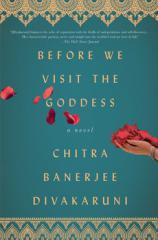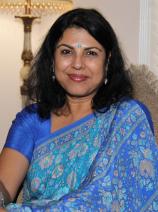Reading Group Guide
Discussion Questions
Before We Visit the Goddess

1. Sabitri is named after a mythic heroine who snatched her husband from death. Is this an ironic or prescient comment on her relationship with Bijan? What do you make of Bela naming her daughter Tara, which Tara believes to be a Western name until she discovers otherwise? What effect do our names have on our actions and personalities?
2. Discuss Sabitri’s vision of death as “a giant brush loaded with white paint...obliterating the shape of the world” (p. 34). What informs her understanding of the effect of her death on those she leaves behind? Where else in the novel do you think the author uses the concept of cleansing as it relates to asking for forgiveness?
3. In “The Assam Incident,” Bela describes her parents as “colliding planets” (p. 35). Would Sabitri and Bijan have described themselves this way? Can or should we trust Bela’s reliability as a narrator during this time in her life?
4. Tara’s troubled adulthood is marked by interactions with two parental stand-ins: Mrs. Mehta and Dr. Venkatachalapathi. Why do you think the interaction with Dr. V affects her long-term in the way that her time spent with Mrs. Mehta does not?
5. Do you think Sabitri’s family caused her heart attack, as Bipin Bihari claims? Discuss the symbolism of literally dying of a broken heart. Does anyone else in the novel suffer this fate?
6. What do you think of the jumps in time and points of view? Were there any story lines or secondary characters you wished you heard more from? Did learning about the characters as the novel progressed change your opinion of them? Give some examples.
7. Is Bipin Bihari’s comment that Sabitri’s “daughter needed her more than Kolkata needed a new dessert” (p. 84) a fair assessment? Is Sabitri repudiating her daughter in favor of her mother? In favor of success?
8. How do Sabitri’s experiences as a young woman inform her attitude toward her daughter’s boyfriend (and later, husband), Sanjay? Under what, if any, circumstances do you think she would have been more welcoming to him?
9. One of the author’s most striking comments on the immigrant experience is via Bela’s observation of Sanjay and Bishu: “As she watched them it struck her that America might have saved their lives, but it had also diminished them” (p. 102). Do you agree with this sentiment? Explain.
10. A running theme throughout the novel is the effect daughters have on their mothers’ lives. Does the author present the mother-daughter relationship in a positive or negative light? Why do you think that each generation can only understand the previous one through the birth of the next?
11. During the titular chapter, Tara muses, “I don’t put much stock in remembering things. Being able to forget is a superior skill” (p. 126). What does this say about Tara’s character at this point in her life? Does her immediate recall of the scent of ashes from the temple call the validity of this statement into question? Why or why not?
12. The novel presents the Indian and American reactions to the traumas of death and the dissolution of a marriage. Compare and contrast the different ways Sabitri and Bela react to these life-cycle events. Which seem more familiar? Does one seem more valid than the other?
13. In the chapter “Bela’s Kitchen,” Kenneth says to the reader, “Mrs. Dewan was important to me because she was worse off than I was. I found it easy to be reasonable with her because her life made me feel less wretched about my own” (p. 149). Does this aspect of Kenneth’s personality color your opinion of him? Why or why not?
14. Consider the statement, “I’m not sure catalysts of change can be so easily identified” (p. 192). What does this mean in the context of the larger story that the author is telling? Can we as readers draw a straight line from Sabitri’s arrival in Kolkata to Tara turning her life around?
15. BEFORE WE VISIT THE GODDESS is framed with the adage “Good daughters are fortunate lamps, brightening the family’s name. Wicked daughters are firebrands, blackening the family’s fame.” Do you agree with Sabitri’s definition of personal achievement being a bright lamp? Why do you think her mother, Durga, left the second half of the saying unspoken? In what ways does this concept weave in and out of the story?
Before We Visit the Goddess
- Publication Date: April 25, 2017
- Genres: Fiction, Women's Fiction
- Paperback: 240 pages
- Publisher: Simon & Schuster
- ISBN-10: 1476792011
- ISBN-13: 9781476792019








